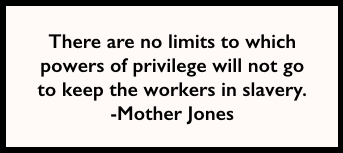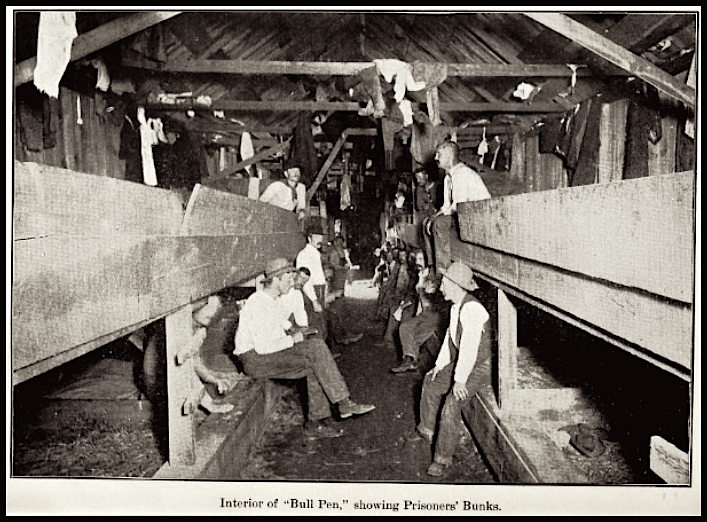 ———-
———-
Hellraisers Journal – Saturday June 10, 1899
Wardner, Idaho – Cruelties Committed Against Miners Under Military Government
From The San Francisco Call of June 8, 1899:
BARBARITIES PRACTICED AT WARDNER
—–
Editor Walker Alleges Great Cruelties
Under Military Government.
—–INQUEST ON A DUMMY
—–
Soldiers Ordered to Shoot Down
Prisoners in the “Bull Pen”
if They Flee From Fire.
—–Special Dispatch to The Call.
—–
Despite the military censorship something that has rather more the semblance of truth than anything that has been sent out so far, is beginning to come from the Coeur d Alenes.
There are two sides to the story of the mining troubles there. It appears labor leaders assert that the Miners’ Union has not been always and altogether to blame. General Merriam, according to the labor side of the story, has gone greatly beyond even what military necessity would mandate in the suppression of riot. A general order to shoot down men if they should seek to escape death by fire can hardly be justified by anything that has occurred in Idaho so far.
—–
BOISE. Idaho, June 7.—W. J. Walker, editor of the Freeman’s labor journal and an organizer fur Western labor, tells a pretty tough story concerning General Merriam and Governor Steunenberg’s military rule in the Coeur d’Alene country. Mr. Walker, being one of the principal leaders in labor matters in the Northwest, is kept posted on the progress of affairs in the Coeur d’Alenes, and he says he knows whereof he speaks in the assertions he makes.
[Said Mr. Walker in an interview today:]
The manner in which things are done in the Coeur d’Alenes under the pretended authority of martial law is scandalous. It is worse. It is a disgrace to the American Government.
I will tell you a few things that have been done under the orders of General Merriam, which I am assured on the highest authority are absolutely true. I am informed that the inquest held on the pretended remains of James [John/Jack] Smith, the union miner who was said to have been killed, was held on a coffin full of rocks. The military could not get possession of the body, and knowing no one would dare to raise a question as to what was in the box, they filled a coffin with rocks and proceeded to hold an inquest on the assumption that the proceedings would stand any way.
During the inquest they went to the wife of one of the miners in the “bull pen” and made her induce her husband to give evidence. The woman was in a delicate condition. They knew she needed the attention of her husband, and told her the only way she could secure his release was for him to give evidence for the Government. They told her they intended to hang at least fifty men under any circumstances, and the only way she could save her husband was by making him tell what he knew. The woman, thoroughly frightened, went to her husband, but he was innocent of having done any wrong and was not afraid of the threats. He refused to have anything to say and tried to allay her fears, but did not succeed. The strain was too much for the sick woman. She went home, was taken critically ill, and the chances, I am informed, are greatly against her recovery. This placed that man in just this position: He was required to swear to a lot of lies to save his wife’s life.
In another case a disinterested citizen was arrested as a witness. He had seen men who took part in the demonstration in which the Bunker Hill and Sullivan mills were destroyed, and as he occupied a neutral position he told the officers when arrested that he knew eight or ten of the men well enough to identify them, which he would do. Accordingly a squad of fifty men were marched out. He was unable to recognize any of them, and another fifty was brought out. He knew none of these, and thirty-five more were marched out. Again he was unable to pick out a man he remembered, and told the officers to keep marching them out, and if there were any he remembered he would identify them, but because he had not been able to recognize any of those he had seen they came to the conclusion that he did not want to identify any one, and threw him into the “bull pen,” where he still remains. With him it was a case of identifying some one whether he knew him or not or go to jail.
One day a fire started in the “bull pen.” One of the men smoking had dropped a spark into the straw given the men to sleep on, and knowing the danger there was of a recurrence of such a fire, the men asked the officer in charge to report to General Merriam and ask to have better water facilities put in. In response Merriam issued an order directing the soldiers, if a fire occurred, to shoot down every man who tried to get out. Now, just consider the result if a bad fire should occur. The prisoners would have to remain and be burned or be shot to death trying to save their lives, for the soldiers would obey orders. Can you imagine a more barbarous order to be issued by a civilized government?
I could tell you enough of just such instances of inhumanity and abuse of authority to fill your paper full and still have more to tell, for they have been practiced every day since the trouble commenced. Whatever may be the merits of the case, I think every one will agree with me that nothing can warrant so unnecessary stretching of authority vested in military officers under martial law.
Mr. Walker made a statement, which, if based on correct information, puts the blowing up of the Bunker Hill and Sullivan mill in an entirely different light than it has hitherto appeared, as he states the Miners’ Union had nothing to do with the blowing up of the mill; that such a thing was not contemplated when the movement on Wardner started, or if it was very few knew of it, and that he was positive that no more than twenty or twenty-five men had anything to do with it.
———-
[Emphasis to first two paragraphs in original, all other emphasis added.]
[Photograph added.]
~~~~~~~~~~~~~~~~~~~~~~
SOURCES
Quote Mother Jones, Powers of Privilege, Ab Chp III
https://www.iww.org/history/library/MotherJones/autobiography/3
The San Francisco Call
(San Francisco, California)
-June 8, 1899
https://chroniclingamerica.loc.gov/lccn/sn85066387/1899-06-08/ed-1/seq-1/
https://chroniclingamerica.loc.gov/lccn/sn85066387/1899-06-08/ed-1/seq-2/
IMAGE
“New” ID Bullpen of 1899, Miners’ Bunks, Hutton p56, 1900
https://archive.org/details/coeurdalenesorta00hutt/page/56
Re: Freeman’s Labor Journal as of 1900: Populist/Labor Weekly of Spokane, Washington, with circulation of 5,300.
Per:
Lord & Thomas and Logan Pocket Directory of the American Press
Chicago, Lord and Thomas, 1900
https://books.google.com/books?id=_DkCAAAAYAAJ
https://play.google.com/books/reader?id=_DkCAAAAYAAJ&hl=en&pg=GBS.PA474
Explanatory (re names, #s, and abbreviations):
https://play.google.com/books/reader?id=_DkCAAAAYAAJ&hl=en&pg=GBS.PA15
Re: The San Francisco Call
https://chroniclingamerica.loc.gov/lccn/sn85066387/
Tag: Wardner ID Bullpen of 1899
https://weneverforget.org/tag/wardner-id-bullpen-of-1899/
The Coeur d’Alenes
A tale of the modern inquisition in Idaho
-by May Arkwright Hutton
Wallace ID, 1900
https://archive.org/details/coeurdalenesorta00hutt/page/n6
“Chapter XVI-The New Bull Pen”
https://archive.org/details/coeurdalenesorta00hutt/page/152
The Class War in Idaho
The Horrors of the Bull Pen
-by Job Harriman
NY, 1900
https://archive.org/stream/classwarinidahoh00harrrich#page/n5/mode/2up
“In the Bull Pen”
https://archive.org/stream/classwarinidahoh00harrrich#page/24/mode/2up/search/bull+pen
The Story of the Bull Pen At Wardner, Idaho
-by Thomas A Hickey
SLP, 1900
http://moses.law.umn.edu/darrow/documents/Bull_Pen_remember_the_bullpen_opt_cropped.pdf
Page 11: “Chapter V-The Bull Pen”
http://moses.law.umn.edu/darrow/documents/Bull_Pen_remember_the_bullpen_opt_cropped.pdf
~~~~~~~~~~~~~~~~~~~~~~~~~~~~~~~~~~~~~~~~~~~~~
Working Man (The Miners Song) – David Alexander
Lyrics by Rita McNeil

